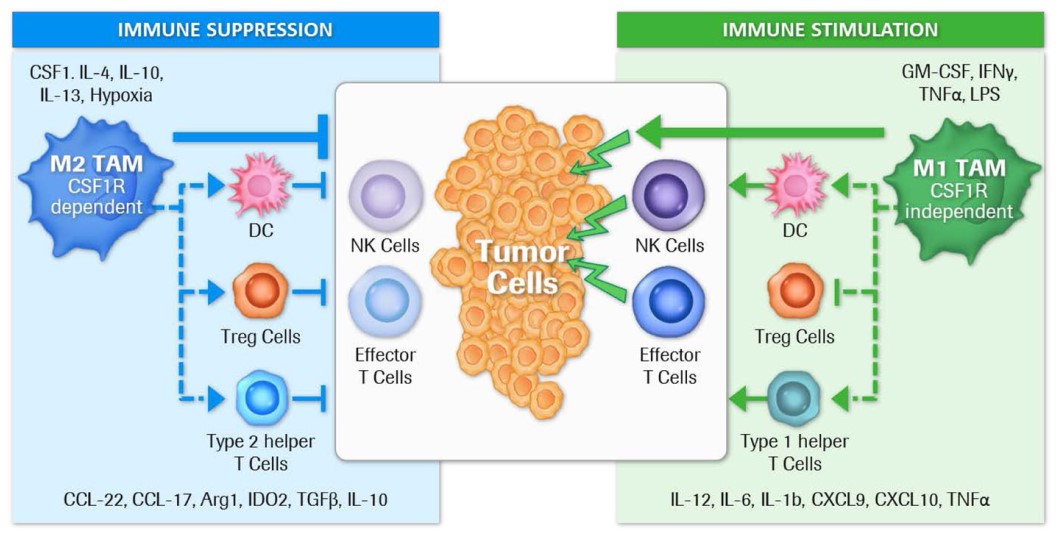Hi-Affi™ Humanized CSF1R Knockin Mouse Model
The promising cancer immunotherapies should eliminate the immunosuppression occurring in the tumor microenvironment and mobilize the human immune system itself to eradicate tumor cells. The colony-stimulating factor 1 receptor (CSF1R) has tumor-promoting and immune suppressive functions. Thus, targeting CSF1R in tumor-associated macrophages (TAMs) represents an attractive strategy for cancer immunotherapy. Creative Biolabs has successfully established an optimized Hi-Affi™ “humanized” animal platform to offer specialty manipulated CSF1R knock-in mice for our clients all over the world.
CSF1R Molecule
The challenge for cancer treatment is immunosuppression caused by the tumor microenvironment. There are two major routes to enhance antitumor immunity-‘Triggering immunostimulatory signaling’ and ‘Blocking immune checkpoints’. The former has been taken as an efficient approach being in combination with the immune checkpoint inhibitors clinically because more than half of cancer patients cannot benefit from immune checkpoint inhibitors alone, such as anti-PD-1, anti-PD-L1, or anti-CTLA-4 antibodies.
CSF1R, a receptor belonging to the type III protein tyrosine kinase family, is responsible for the survival, proliferation, and differentiation of macrophages. Studies found various immune cells expressing CSF1R, including TAMs and other myeloid cells in tumor microenvironment such as dendritic cells (DCs), neutrophils, and myeloid-derived suppressor cells (MDSCs). In multiple tumor subtypes, CSF1R has been found with an overexpression pattern which plays an important role in tumor malignant proliferation, metastasis, and microenvironment regulation.
CSF1R Signal Pathway
Upon activation by the intracellular ligand CSF1, CSF1R signaling regulates the differentiation and survival of the mononuclear phagocyte system and macrophages in particular. This CSF1/CSF1R axis plays a prominent role in the tumor promotion and immunosuppression of TAMs in tumors. Studies have shown that blocking the CSF1/CSF1R pathway using CSF1R inhibitors (small-molecule inhibitors or monoclonal antibodies) significantly reduced macrophage infiltration in tumor sites, and slowed primary tumor growth and tumor metastasis. Therefore, suppressing the survival and activation of TAMs by inhibiting CSF1/CSF1R signaling has become an important strategy for cancer immunotherapy.
 Fig.1 Tumor promoting and immune suppressive M2 macrophages/TAM are dependent on CSF1R mediated signals. (Cannarile, 2017)
Fig.1 Tumor promoting and immune suppressive M2 macrophages/TAM are dependent on CSF1R mediated signals. (Cannarile, 2017)
Development of Humanized CSF1R Knock-In Mice
Recently, targeting the signal pathway involving in oncogenesis and immunosuppression has been utilized combining with other immunotherapies, to further improve efficacy in cancer patients. CSF1R is a well-validated molecular target for anticancer drug discovery for its important role in mediating TAMs. With advanced technology, Creative Biolabs can provide you with the humanized CSF1R knock-in mouse model and related analysis services. Please feel free to contact us for more details.
Creative Biolabs also offers other various Humanized Mouse Models you may be interested in:
Reference
- Cannarile, MA.; et al. Colony-stimulating factor 1 receptor (CSF1R) inhibitors in cancer therapy. J Immunother Cancer. 2017, 5(1): 53.
For Research Use Only.
